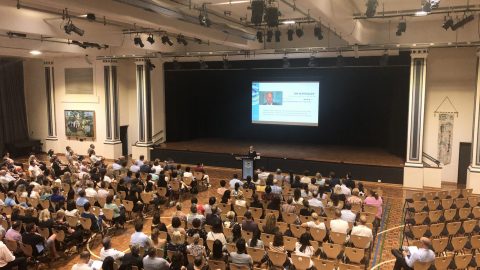Why Students Should Focus on Mastering a Discipline

Thank you to the many parents in the Senior School who attended the Parent Information Evening on Thursday of this week. I wish to also thank the Parents’ and Friends’ Association for providing the Welcome Drinks for members of our parent community.
In my Address at the Parent Information evening, I shared the views of Australia’s Chief Scientist, Dr Alan Finkel AO. Dr Finkel in recent times has questioned the ‘over emphasis’ in schools on needing to develop ‘21st century skills’.
In using this term, Dr Finkel is referring to soft skills such as problem solving, collaboration and team work. Interestingly, the New South Wales Department of Education released a report, prepared by Professor John Buchanan from the Business School of the University of Sydney, which examined what today’s ELC children will ‘need’ in order to thrive in the 21st century, not just in work, but in life. What Professor Buchanan’s research found was that a widespread preoccupation with the so-called ‘soft’ or ‘generic employability’ skills, coupled with a belief that actually ‘knowing things’, was now outdated.
Dr Finkel argues the importance of actually ‘specialising’ in something, mastering a discipline, building a solid foundation in content that can then be applied through problem solving. He believes this remains essential and should not be overlooked by a preoccupation with perceived 21st century skills.
His commentary also refers to the ‘T-shaped worker’, a term that was first coined by IBM. The vertical line of the ‘T’ represents a deep expertise in a specialised field and the horizontal bar represents the flexibility to apply this expertise creatively and collaboratively across a range of different situations and scenarios. While he noted the importance of the horizontal bar, Dr Finkel stresses the critical need for the vertical line, and the value of education at school in developing that line.
Twenty-first century skills are the current buzz words in education. So, while I see our girls at St Catherine’s developing their 21st century skills in leaps and bounds, their horizontal bars are broadening daily in the classroom and in co-curricular activities, and certainly the House Arts in December last year was one such example. An outstanding example really, with the girls’ collaborative skills, creative problem solving techniques, leadership development and team work clearly on display. However, we need to implore our girls to build up their vertical lines. As teachers and parents, we must provide support structures for our developing ‘T-shaped students’ and provide the best environment for strengthening their vertical lines.
The changes to the academic profile and scheduling implemented at St Catherine’s this year are substantially supported by Dr Finkel’s view and a need for girls to build a solid foundation. This is achieved by firstly building expertise in two fundamental subjects: English and Mathematics. Neither can be picked up easily later in life. They are best learned, layer upon layer, from Prep to Year 12.
“Mastery of Language is crucial to succeeding in whatever you do, whether it is writing a report, a job application; your ability to “win friends and influence people” will only be as good as your language skills. The best way to hone them is to read a lot and read some more. Novels, histories, science-fiction – it does not matter, girls just have to read!” (Finkel, 2018)
“Mathematics is the language of Science and Commerce. We cannot over emphasise that for many tertiary courses, you must have strong knowledge of Mathematics. These include Medicine, Science, Engineering, Economics and Commerce.” Many of our 2018 Year 12 graduates have pursued tertiary pathways this year, in Victoria and interstate.
Mathematics is also a textbook example of why you need to learn things in sequence, developing an ability to methodically solve problems through hard work, with the guidance of an expert teacher. Interestingly, the world leader ranked last year by Forbes magazine as the most powerful woman in the world, German Chancellor Angela Merkel, performed poorly in a high school Physics course. Refusing to be beaten by the subject, she pursued Physics at university and went on to earn a Doctorate in Quantum Chemistry. Her political success is often attributed to her capacity to approach problems methodically, combined with a brain described by German media as a “machine for learning”.
The redeveloped timetable in our Senior School this year has focused on returning allocated time to the core subjects of English, Mathematics, History and Science in Years 7 to 10. For example, in Year 10 Mathematics, English and History, the time allocation has been increased from 10 lessons a cycle to 12 lessons. Whilst this may not sound like a lot, the accumulation over the full year results in an increase of over 24 hours to build foundation knowledge and skills. This is an increase of twenty per cent in these subjects.
Our girls in Year 8 need to select one language with a focus on building mastery in this language over the years in the lead up to VCE. I encourage girls to take every opportunity to enable this mastery with suggestions such as travelling on a School Study Tour or Exchange Program, hosting Exchange students, and practise, persevere and persist with the development of oral and aural skills.
To launch girls into the sciences at VCE level, the Year 10 program enables students to select the elective of studying a science for a full semester. Chemistry, Physics, Biology and Psychology will now be completed in Year 10 as one discipline across 16 weeks, and with two additional lessons per cycle, an increase of almost double the contact time with a teacher has been ensured. This is a credible and exciting launch pad into VCE studies.
In closing, I would like to recognise the joint recipients of the 2019 Australian of the Year Award, Dr Richard Harris OAM and Dr Craig Challen SC OAM, who exhibited extraordinary levels of cooperation, team work and tireless problem solving skills as they successfully rescued 12 soccer players from a flooded cave in Thailand. Whilst these 21st Century skills were vital, their expertise as skilled scuba divers, in addition to Harris as an anaesthetist and Challen as a vet, ensured the success of the rescue operation. They have committed to using this platform to encourage Australian children to challenge themselves, to take a few risks, graze their knees, stub their toes and, importantly, to find a passion, work hard and aim to be really good at something.



